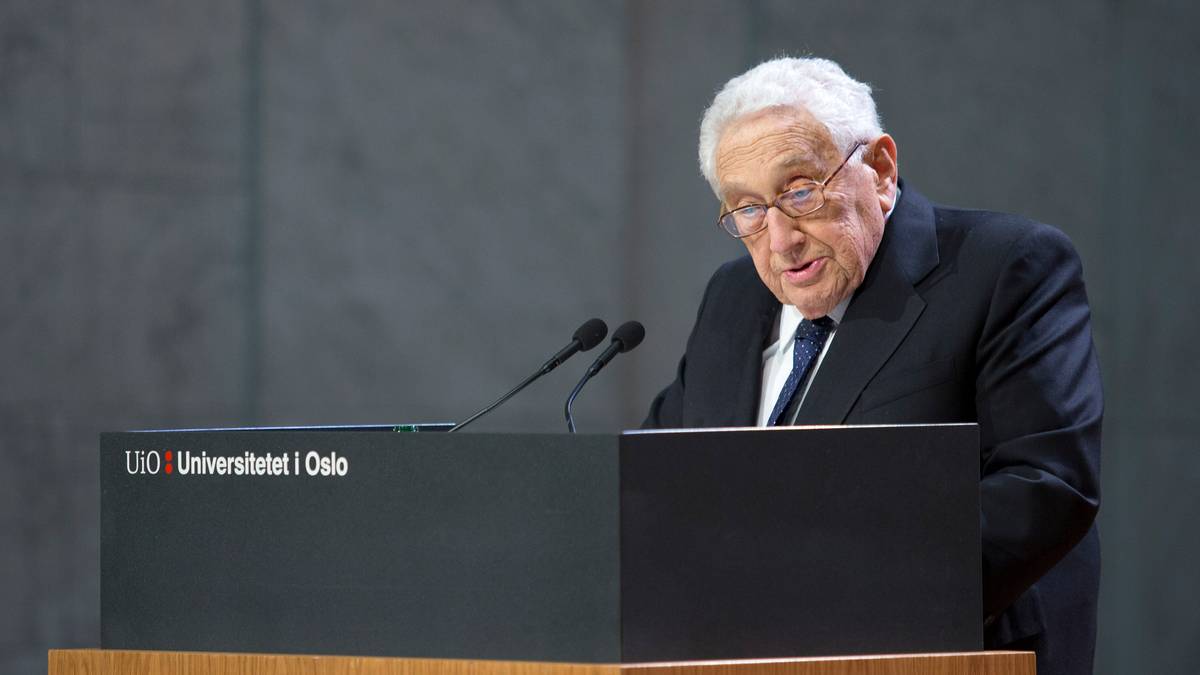Kissinger died at his home in Connecticut on Wednesday. This was stated by Kissinger Consulting Company, in a statement late Thursday evening, Norwegian time.
Kissinger remained active after he turned 100 in May of this year, attending White House meetings and publishing a book on leadership style.
He also recently testified before a Senate committee on the North Korean nuclear threat.

Then-US Secretary of State Henry Kissinger during the NATO Ministerial Council conference in Oslo in 1976, surrounded by security guards.
Photo: Udvar Wally Jensen/NTB
– He lost his distinctive voice
– The United States lost one of the country’s most prominent voices with the passing of Henry Kissinger, says former President George W. Bush.
Bush describes Kissinger as one of “the most consistent and distinguished voices in American foreign policy.”
Kissinger’s path from being a Jewish refugee from Germany to being at the forefront of American foreign policy decisions “is as much about his own greatness as it is about America’s greatness,” Bush says.

Former President George W. Bush with Henry Kissinger in New York in 2008.
Photograph: Charles Darabak/AP
China is a friend
The former Secretary of State is known to have played an important role in improving US relations with China in the 1970s. Today, he is referred to as a “legendary diplomat” on Chinese state television.
He has previously visited China more than 100 times, and was there last July this year. He then went on a surprise visit to Beijing, where he met with Chinese President Xi Jinping.
China’s ambassador to the United States, Zi Feng, described Kissinger’s death as a great loss to the world, but he will always remain alive in the hearts of the Chinese people.

Henry Kissinger and Chinese President Xi Jinping in Beijing in 2015.
Photograph: Mark Ralston/AFP
Born in Germany
At the age of fifteen, Kissinger, along with his parents and younger brother, fled persecution of Jews in Germany, first to London, and later to New York.
During World War II, he was attached to American intelligence and was sent to Germany, where, among other things, he led the search for Gestapo officers in Hanover.
After the war, there were studies that culminated in one of the longest doctoral dissertations in political science ever delivered at Harvard.
Kissinger generated early controversy, among other things, when in 1957 he called for the use of tactical nuclear weapons to win wars. He also attracted criticism when he said that morality and public opinion have nothing to do with foreign policy, while leaders agree among themselves.

When Henry Kissinger visited Oslo at the invitation of the Nobel Institute and the University of Oslo, he was greeted by demonstrators
Photo: Terry Bendixby/NTB
praised and criticized
Some praised Kissinger as a true politician, others described him as a war criminal.
He never made any secret of his desire to influence American foreign policy, and became involved early on the Republican side. He made three unsuccessful attempts to become the party’s presidential nominee in the 1960s.
In the last attempt, Rockefeller lost to Richard Nixon, who won the presidential elections in 1968. He appointed Kissinger as his National Security Advisor, and in 1973 he appointed him Secretary of State.

A demonstrator, dressed as a former soldier wounded in Vietnam, accompanied Henry Kissinger when he arrived in Oslo on May 20, 1976. Kissinger visited Oslo in connection with a meeting of NATO foreign ministers.
Image: NTP
When Nixon’s presidency ended in scandal and resignation, his successor, Gerald Ford, allowed Kissinger to continue as Secretary of State. In the same year, he was awarded the Nobel Peace Prize along with North Vietnamese negotiator Le Duc Tho.
The award sparked massive protests, and the Nobel Committee was accused of rewarding war criminals, and the war in Vietnam was not far from over.
Le Duc Tho refused the award, and Kissinger did not come to Oslo to accept it either.

Former Prime Minister Udvar Nordli (AFP) received Henry Kissinger at his table during a dinner at Akershus Castle in 1976, a year after US forces withdrew from Vietnam.
Photo: Henrik Lorvik/NTB

“Organizer. Social media geek. General communicator. Bacon scholar. Proud pop culture trailblazer.”

